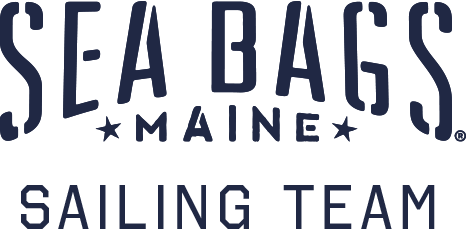I Think I Can...
By Erica Beck Spencer, Skipper Sea Bags Women’s Sailing Team, J24 2918
Today I’m reflecting upon our second major sailing event with the J24 Sea Bags Women’s Team, the US J24 Nationals in Saville, NY.
Sea Bags Women's Sailing Team
40 boats attended the 2016 US Nationals and unfortunately luck was not on our side for most of the event. Despite our safety checks on hardware when rigging the boat things came undone while racing, the welding on a jib car broke (luckily before a race), and we kept picking the wrong side of the course. It wasn’t our best regatta and truly we only had one great race with a top ten finish.
Despite all of this the learning curve was great and the conditions on Sunday pushed me way out of my comfort zone. The forecast for Sunday was ominous. It kept getting worse as the regatta progressed… or better, depending on your opinion of big breeze. By Sunday morning there was no doubt, it was going to hoot. Nobody left the harbor with a genoa on deck—only the much smaller jibs. This was a sure sign it was going to blow snot all day. I talked to many tuning tacticians that were setting their rigs for the heaviest setting. I did the same and set the rig for our tightest setting to depower the boat as much as possible. Most tuners, tune to base on the dock and then adjust on the water. They tune to the conditions, not the forecast. On Sunday there was no doubt that we’d see 20+ knots with gusts in the 30s so we set for heavy air on the dock.
And here’s where I get to the point of this blog post -- I was scared. I had never driven any sailboat in breeze as consistently strong as what we were going to have. As the skipper I’m responsible for everyone on the boat and for the boat itself. All morning I fought the voice of self-doubt. Are you qualified to do this? Can you handle this? Will you be able to avoid an out-of-control boat at the windward mark? Will you be an out-of-control boat at the windward mark? I quietly spoke to several experts before heading out about things to be cautious of. I talked to Kris Werner of Quantum and Carter White of the co-ed Sea Bags team. Here are some of the points that I took away from these mini-coaching sessions:
Keep some distance from newer teams out there that aren’t comfortable starting in these kinds of conditions. They may be out of control and could really make it hard to get a clean start.
Head out tuned for the tightest setting on the rig, with mast butt max forward.
Be careful at mark roundings. There will be out of control boats.
Trimmer and driver need to work together. When crew counts down to a big puff--both need to be ready to burp the jib and main simultaneously and bring them back in keeping the boat at the same angle of heel. For smaller velocity increases, talk together about if just one sail needs to be dumped a few inches. In smaller puffs, the jib stays in and the main gets dumped slightly.
Backstay on hard upwind. Vang-sheeting -- traveler stays up to midship and the main sheet is dumped in big puffs.
Downwind: twings all the way down. Keep the boat under the tip of the mast. Tip of mast leans to the starboard, push tiller to port slightly to get the boat back under the mast. Weight back in boat. Two hands on tiller (ditch using the tiller extension). Tactician can help with mainsheet in gybes.
This was not the first time when I’d question my competence. For example, in college, at my first big women’s event at Yale, I said to my coach Sarah Kent, “I don’t belong here. All of these women have been racing for years and I’m not good enough.” Or the time it blew stink the first time crewing on a J24. Will I be able to do the foredeck in this kind of breeze? Now as a mother, there is self-doubt about my parenting because of sailing, Will I be a good-enough mother if I do this time-consuming thing for myself? or the time right before my first regatta as the skipper for Wait For It… at midwinters when I confessed to my father, “I don’t know if I’m ready for this.” Every time I’d move through these am-I-competent-enough moments and I’d just do it. And each time, I’d do better than I thought I could, and each time I’d walk away knowing I could, and firm in the knowledge that we’d get better each time I do it.
So, I’d just do it. I’d ask a lot of questions and trust that between myself and the other teammates that we’d figure things out. I knew we’d make mistakes and we’d learn from them. Last year rigging and de-rigging took forever. Now we’re getting the rudder off, mast down, shrouds off and stowed, mast and keel covers on, boat strapped to trailer faster than some other boats and way faster than we did it a year ago. Once upon a time, everything was new, but every time we do something we get better.
Chris Jankowski, a great sailor, as well as the former owner of our boat said, “Having confidence is the first big step.” The only way to get that confidence is to get over the “Can I?” questions and just do it. The next time it’s hooting I’ll think, We’ve got this!
Check out the results here: http://j24nationals.com/
Top Sea Bags Sailing Team results were; Will Welles in first, Carter White in second & Travis Odenbach in 6th overall.

